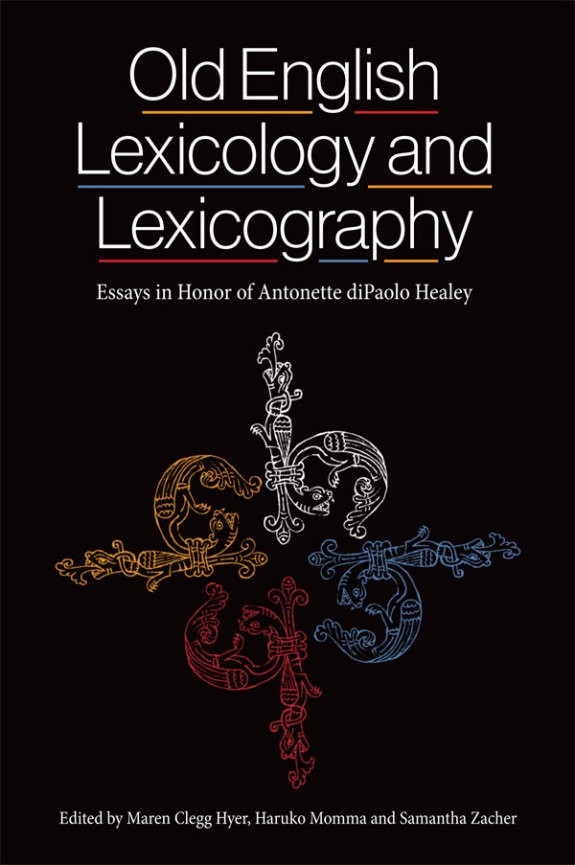Students and colleagues, past and present, have honoured University of Toronto Professor Emerita Antonette (Toni) diPaolo Healey’s body of work in a new collection of writings.
The book, Old English Lexicology and Lexicography: Essays in Honor of Antonette diPaolo Healey highlights her remarkable achievements as an innovator and lexicographer of the Old English Concordance, the Dictionary of Old English Web Corpus and the Dictionary of Old English.
The collection of essays reflects firsthand the language research made possible by Healey's landmark contributions to her field, with chapters that demonstrate how the study of words can lead to greater insights and understanding of early medieval English, as well as early medieval English authors and their works.
“I was touched by the contributors’ superb essays and kind words,” says Healey. “At the back of the book, colleagues chose Old English words that they thought either characterized me or would be useful to me.”

Some of those words include “frēond” (friend), “glæd-mōd” (cheerful), “lufu” (love), and “wīs-dōm” (wisdom).
The book’s three editors, Maren Clegg Hyer, Haruko Momma and Samantha Zacher — all university professors — are former students of Healey’s who felt compelled to show their gratitude.
“The other editors and I had an earnest desire to create this book in her honour as a tribute to her remarkable contributions to the fields we study, but also as a tribute to the dedicated teacher, mentor and friend Toni is and has been to many U of T students across the years,” says Hyer, a professor of English at Valdosta State University in Georgia.
“Toni is a dedicated teacher, a great lexicographer, and the kindest and most generous person all in one,” adds Momma, a professor of English at New York University.
Healey first arrived at U of T as a graduate student in the late 1960s. Her supervisor was Angus Cameron, the founding editor of the DOE — an ongoing project to identify and define every word in the English language from 600-1150 CE.
Under Cameron’s guidance, Healey completed her thesis in 1973. “I edited an Old English text called the Vision of St. Paul which had never been edited before,” she says.
At that time, Cameron had begun to create the DOE and asked if Healey would stay on and work with him. Healey, at first, turned him down, wanting to focus on teaching instead.
We respect and admire Toni for her brilliant linguistic mind and for the field-changing work she has done. But we also love and admire her for who she chooses to be as a person, teacher and friend.
She taught at Yale University from 1974 to 1978. “Historically, it was an exciting time. Yale College had begun admitting women in 1969, and I was among the first wave of female faculty hired,” she says.
But Cameron never gave up and approached Healey again, convincing her to return to U of T in 1978, primarily to work on the DOE, but also to teach.
“Angus put together a wonderful team of people,” says Healey. “We were all about the same age, we were in our late 20s and early 30s at the time. It was a lively congenial group.
There were many attractions to me in working on the dictionary,” adds Healey. “One of the things I really liked was the team research. In ‘78 it was rare to have team research in the humanities. The other thing that attracted me was that I would have, before my eyes, the whole body of Old English writings. This really appealed to me.”
Looking back, she’s most proud of two things — both involving the creation of research tools and resources that made Old English more accessible to scholars.
She remembers the massive task of transferring all of Old English from manuscripts to megabytes on microfiche in the late ‘70s as PCs did not yet exist.
“Technology hadn't advanced enough,” says Healey. “A Microfiche Concordance to Old English listed every Old English word with a full sentence of context. There was a kind of comprehensiveness that had not been possible in our field before. For the first time, Old English was widely available to scholars and students in a card-sized box on a desk.”
She was also especially proud of having helped create electronic links from the DOE to the Oxford English Dictionary in 2007, creating a vast accessible online resource.
“This was the first time that two major dictionaries, two historical dictionaries of the English language were linked electronically to each other,” she says. “We created research tools that are very useful and I think that has helped advance research in our field.”
The editors of the collection couldn’t agree more.
“We respect and admire Toni for her brilliant linguistic mind and for the field-changing work she has done,” says Hyer. “But we also love and admire her for who she chooses to be as a person, teacher and friend.”

